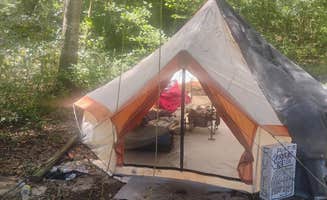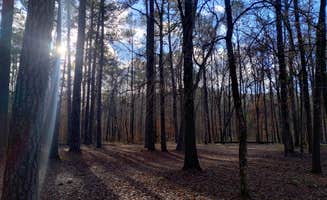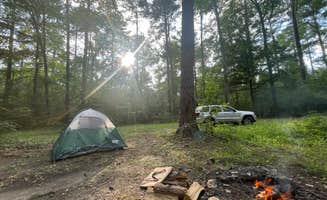Dispersed camping near Fayetteville, Georgia offers primitive outdoor experiences in areas that require specific permits and preparation. Located in the Piedmont region of Georgia, these backcountry sites typically sit at elevations between 700-1,000 feet, with hot, humid summers and mild winters. Most dispersed camping locations remain accessible year-round, though seasonal hunting activities significantly impact camping conditions.
What to do
Hiking trails access: At Rum Creek WMA, several unmarked paths provide opportunities for wildlife viewing and exploring the natural landscape. "Perfect for tent camping. Must have a hunting or fishing license or a land use pass," notes Brian K., emphasizing the permit requirements that apply to all WMA activities.
Fishing opportunities: The Ocmulgee River Camp provides access to river fishing. One camper reports, "Beautiful campsite, just a few neighbors, tons of flat space and a few fire pits. There are hunters around and we heard a good deal of shots. Saw some deer on a walk."
Wildlife photography: Early mornings at dispersed sites offer prime wildlife viewing. J.A. from Ocmulgee River Camp shares, "Very nice a bit bumpy on the drive in but no major holes. Quiet and peaceful 2 neighbors great amount of space to find a nice spot."
What campers like
Solitude and space: Many campers appreciate the room to spread out at Joe Kurz Wildlife Management Area. Lenear B. mentions, "No cell coverage, has fire pit, mostly tent and car campers. I went with a travel trailer."
Dark night skies: The minimal light pollution at Tyler Hunt Camp creates excellent stargazing conditions. LeeAnne T. describes it as "a refuge. There are privately owned homes around but the folks keep to themselves. It's quiet, super dark at night and beautiful."
Seasonal variations: Winter camping provides different experiences from summer stays. Greg D. found Ocmulgee River Camp to be "Open spaces and very quiet this time of the year (January) train horn in the distance and gunshots in the distance as well from hunters here and there but all around a great spot to really enjoy."
What you should know
License requirements: Georgia Wildlife Management Areas require specific permits. Lonnie B. at Joe Kurz WMA notes the "requirement for a valid Georgia hunting or fishing license to camp, reflecting the area's primary use for hunting and fishing activities."
Road conditions: Access roads vary significantly in quality. Michael S. describes Ocmulgee River Camp as a "Nice open camp site with plenty of spots for camping. Only a mile off the road, which is a little bumpy but manageable."
Safety awareness: Be prepared for potential security issues at some sites. Micah C. from Tyler Hunt Camp shared: "I enjoyed my stay here during the day, but things changed after dark. As night fell, I began preparing for bed, but I noticed vehicles coming and going—at least three within an hour. Around 10 PM, a few Mustangs pulled up and sat for about 45 minutes."
Tips for camping with families
Weather preparation: Georgia's climate can change rapidly, particularly in shoulder seasons. Julie H. at Ocmulgee River Camp reports: "It was quite hot but surprisingly not that buggy," indicating that insect activity may be less problematic than expected in certain conditions.
Wildlife education opportunities: Turn wildlife sightings into learning experiences. SJ W. at Ocmulgee River Camp recounts: "It was nice and warm even in December! Almost 70 degrees! Spot with a nice horse trail to hike - saw some deer and a mystery black animal, maybe a boar or a bear - unsure."
Local activity monitoring: Be aware of hunting activities and train noise that might startle children. One camper notes, "There are hunters around and we heard a good deal of shots," while another mentions "train horn in the distance."
Tips from RVers
Site selection criteria: At dispersed camping areas, arrive early to find level spots for RVs. Lenear B. shares their experience at Joe Kurz WMA: "I went with a travel trailer," demonstrating that some RVs can access these primitive areas.
Supply planning: No services means bringing everything needed. LeeAnne T. emphasizes: "No amenities, you pack it in, you pack it out. The state keeps it and the road in nice."
Access route research: Call ahead or check recent reviews about road conditions, particularly after rain events. J.A. found access to Ocmulgee River Camp to be "a bit bumpy on the drive in but no major holes," suggesting smaller trailers and RVs can navigate with caution.




